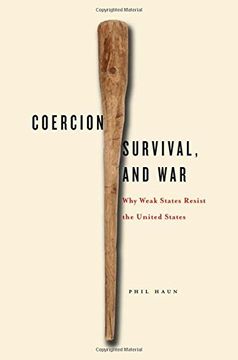Compartir
Coercion, Survival, and War: Why Weak States Resist the United States (en Inglés)
Phil Haun (Autor)
·
Stanford Security Studies
· Tapa Dura
Coercion, Survival, and War: Why Weak States Resist the United States (en Inglés) - Phil Haun
$ 55.370
$ 92.290
Ahorras: $ 36.920
Elige la lista en la que quieres agregar tu producto o crea una nueva lista
✓ Producto agregado correctamente a la lista de deseos.
Ir a Mis Listas
Origen: Estados Unidos
(Costos de importación incluídos en el precio)
Se enviará desde nuestra bodega entre el
Jueves 30 de Mayo y el
Martes 11 de Junio.
Lo recibirás en cualquier lugar de Chile entre 1 y 3 días hábiles luego del envío.
Reseña del libro "Coercion, Survival, and War: Why Weak States Resist the United States (en Inglés)"
In asymmetric interstate conflicts, great powers have the capability to coerce weak states by threatening their survival―but not vice versa. It is therefore the great power that decides whether to escalate a conflict into a crisis by adopting a coercive strategy. In practice, however, the coercive strategies of the U.S. have frequently failed. In Coercion, Survival and War Phil Haun chronicles 30 asymmetric interstate crises involving the US from 1918 to 2003. The U.S. chose coercive strategies in 23 of these cases, but coercion failed half of the time: most often because the more powerful U.S. made demands that threatened the very survival of the weak state, causing it to resist as long as it had the means to do so. It is an unfortunate paradox Haun notes that, where the U.S. may prefer brute force to coercion, these power asymmetries may well lead it to first attempt coercive strategies that are expected to fail in order to justify the war it desires. He concludes that, when coercion is preferred to brute force there are clear limits as to what can be demanded. In such cases, he suggests, U.S. policymakers can improve the chances of success by matching appropriate threats to demands, by including other great powers in the coercive process, and by reducing a weak state leader's reputational costs by giving him or her face-saving options.
- 0% (0)
- 0% (0)
- 0% (0)
- 0% (0)
- 0% (0)
Todos los libros de nuestro catálogo son Originales.
El libro está escrito en Inglés.
La encuadernación de esta edición es Tapa Dura.
✓ Producto agregado correctamente al carro, Ir a Pagar.

